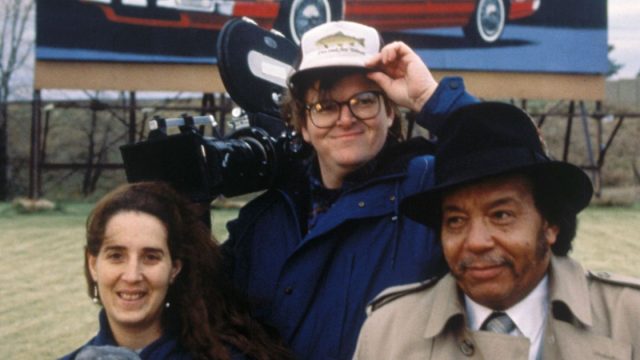It’s fitting that the very first words spoken in Michael Moore’s debut, Roger and Me, are “I was kind of a strange child.” While the film has two narratives at play — the financial ruin of Moore’s hometown of Flint, Michigan, and his attempts to interview General Motors executive Roger Smith— from the start, we know that everything is going to be filtered through a personal perspective. Moore’s narrative continuously goes back to his hometown’s ties to GM and himself, with his aw-shucks everyman persona, aiming for a simple interview. Moore’s style as a documentarian is fully formed here, with his ironic use of stock footage in the Bruce Conner style, the interviews on both ends of the economic spectrum, and Moore as the main character. Whether this approach works for you depends on how much you like Moore as a personality and how much you agree with his politics.
Along the way, we follow locals like Sheriff’s Deputy Fred Ross as he evicts people from their homes and local rabbit and dog breeder Rhonda Britton, who famously sells rabbits for pets or meat. The celebrity interviews Moore manages to snag are also relevant. Pat Boone and Anita Bryant, who have bothendorsedGM, give vanilla “love the company, feel bad for those fired” interviews, while Flint native Bob Eubanks embarrasses himself nearly every time he opens his mouth, culminating with a typical ‘80s anti-gay anti-Jew joke.
As a historical document, regardless of the liberties Moore takes with the timeline of events, the images of an American city at the end of the ’80s falling apart remain a powerful indictment of the profits-at-all-costs mindset of major corporations. This is the legacy of Reagan’s America, and it doesn’t matter that Moore had a prior interview with Smith before filming began, or that the evictions at the end of the film technically occurred on a different day than Smith’s Christmas speech. This comes down to how fairly you think a major corporation should be represented, and frankly, I’m never going to be on the side of a company that knowingly ruins thousands of lives because they can make more money elsewhere. Corporations in trouble can get a government bailout. Laid-off workers get called lazy for not finding new work fast enough.
Roger and Me works beautifully as an underdog story with humor, pathos, and a memorable cast of characters. It’s Moore’s most focused film because it keeps its story mainly in Flint and its focus on GM. The constant shots of dilapidated buildings and garbage piling in the streets are a stark contrast to the embarrassing attempts by the local government to put a positive spin on things and the increasingly pathetic gimmicks used to try to bring business back into Flint. By the time Moore gets his brief interview with Smith, it’s a non-event. Smith was never going to come visit Flint, and there is nothing learned during their brief exchange that we didn’t already know. For Roger and Me, the journey is the point, and the destination is irrelevant.


